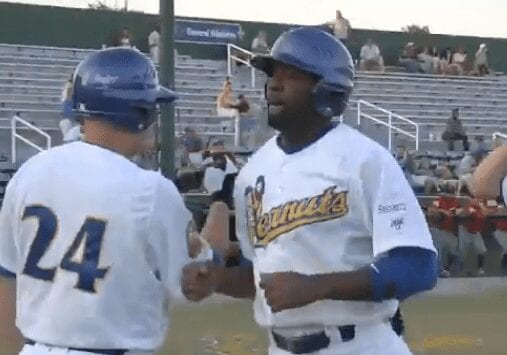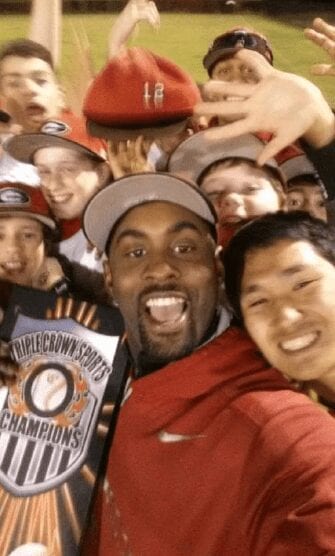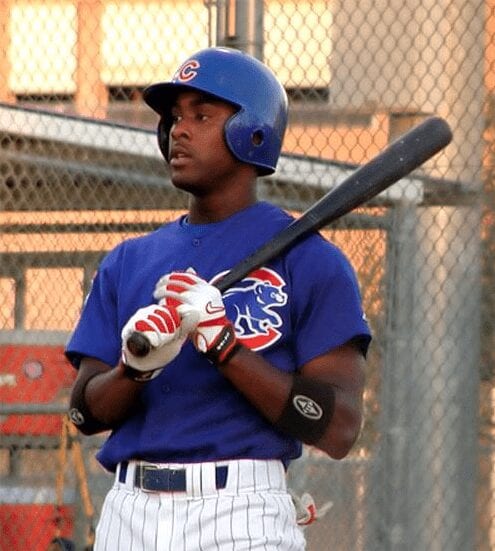 Although there’s, oh, a 96.5 percent chance you’ve never heard of Jasha Balcom, there’s a 95 percent chance you’ve seen him—either in the film, 42, or in a commercial for the film, 42.
Although there’s, oh, a 96.5 percent chance you’ve never heard of Jasha Balcom, there’s a 95 percent chance you’ve seen him—either in the film, 42, or in a commercial for the film, 42.
That’s because Balcom, a 32-year-old Georgia native, is Jackie Robinson.
OK … OK—Jasha didn’t play the legendary Brooklyn Dodger. But he was the stunt double for actor Chadwick Boseman. Which means whenever you saw a hard slide into second, a charge up the first base line, a mighty swing, a dive into the gap—well, that was almost always Balcom. Which makes perfect sense, considering Jasha’s background as a minor league ballplayer who reached Class A with the Chicago Cubs before spending a fascinating year with Wally Backman and the independent South Georgia Peanuts.
Here, Jasha explains how he went from 42 (the round he was selected in the 2000 June amateur draft) to 42. He talks baseball dreams and baseball nightmares, the art of hitting and why he probably won’t emerge again as Celine Dion’s cinematic understudy.
Jasha Balcom, step up to the plate. You’ve been Quazed …
JEFF PEARLMAN: OK, Jasha, so your modern-day claim to fame comes in having played the stunt double as Jackie Robinson in the film “42.” I’ll ask two things: 1. How did this come to be? 2. Why did Chadwick Boseman need a stunt double? What were the complexities and difficulties that came with being the physical reincarnation of Jackie Robinson?
JASHA BALCOM: It came about from a phone call one day from a buddy from the Cubs I played with. He was tasked with assisting the second unit director in finding local baseball talent. So he called me originally asking if I would be interested in appearing in the Negro Leagues scenes from the first part the movie. I said, “Of course! Man, are you kidding me? Absolutely.” I sent him my information, baseball pictures etc. … and I ended up getting called immediately by Alan Graf, the stunt director. He said that I resembled and had a similar build as Chad and asked if I could come and try out for the part. I went to the training camp, and performed the athletic plays for the audition and won the spot.
Chad had the mannerisms of Jackie down. But for some of real action athletic baseball scenes—fielding, diving and catching—I had to help him out. He did well, though. He worked with a baseball coach for several months before filming. But I can tell you it was hard enough for me with those 1942 two-and-three finger pancake gloves those guys used in that time period. Baseball is a tough sport with regular equipment. Also you can’t have your star getting too many strawberry burns on his ass from sliding take after take.
Some of the challenges were really trying to bring out the power and quickness of Jackie. His running style was very unique. I watched lots of footage of him before we started shooting. That helped me out a ton.
J.P.: You were selected by the Cubs out of the University of Georgia in the 33rd round of the 2003 Draft, reached Class A Peoria but left in 2005. I’m sure it all began with Major League dreams—so what happened? Why did you stop? And what was the difference—physically, mentally, whatever—between you and a Major Leaguer? What did you lack?
J.B.: Yes, I started my career after Georgia with the Cubs and after putting up great numbers with them I was released and quickly picked up by the Cardinals. In 2005 I walked away to cope with a personal tragedy. I lost my father Charles Balcom to cancer. At that time I simply asked for my release and I wanted to worry about baseball later.
There wasn’t much difference, talent-wise, I played in Big League spring training games. I was young but needed the at-bats. Now, being older and more mature, I know there definitely is a mental difference between the Major Leagues and the minors. Major Leaguers don’t make a lot of mistakes fundamentally. They’re very consistent. Mentally, those guys know what their job is and how to get it done every day. Since I have been teaching hitting for so long I know what adjustments have to be made.
I lacked a little bit of size, I guess. Teams are more interested if you have projectable numbers and a body type that gets you a little bit more time on the farm.
J.P.: You played briefly for the South Georgia Peanuts of the South Coast League. I saw a fascinating documentary about the team (managed by Wally Backman) and the league. What was that experience like? How unstable were things? What sort of crowds came?
J.B.: That experience was a fun time in my life. After being out of baseball for two years, working in a corporate 9-to-5 desk job, putting on the uniform again was truly a freeing and happy time in my life. It was good to be back in the clubhouse again. Wally Backman is one of the best managers I have every played for. It was wild. Every day brought something different.
Things were normal according to pro baseball life, clubhouse pranks and not-safe-for-work locker-room conversations. Wally’s personality and his eruptions on the umps made it fun coming to the park every day. You had no idea what was going to happen.

J.P.: What’s it like when you play baseball your whole life, and you realize, “This isn’t going to happen?” When was that moment for you? How did you handle it? Accept it?
J.B.: Jeff, man, to be honest man It really sucked. My entire self identity was as a professional player. I had no clue what I was supposed to do or what I was good at. I felt I belonged on the diamond.
I still haven’t accepted it yet Jeff. I’m going to be in the Majors one day. I’m still living the dream, possibly as Big League hitting coach. Mark my words! I’m not done yet.
J.P.: I know you’re from Dublin, Georgia, I know you played at the University of Georgia. But what was your path from womb to baseball? Like, who got you into the game? Where did the love come from? Was there a moment when you realized, “I’m pretty special at this?”
J.B.: My path started in the Dublin County Rec Department at Springdale Park. My father worked maintenance for the park, so thanks to some fees being cut I got to start organized baseball when I was 4. That’s very early.
Growing up in a small town, sports were all there was to do. That was my outlet. I didn’t really want to be like “Mike”—I wanted to be like Ken Griffey, Jr. So much so that, when I was 7, I taught myself to hit left handed just like he did. I actually forgot how to hit righty later on in my career.
That love was always there, from hitting rocks with my bat outside, learning how to throw by drilling our mailbox with rocks. I got pretty consistent with the ol’ rocks. My mom could tell you that. There were no training facilities, no coaches to help me. All I had was visualization and a dream.
J.P.: I hope this isn’t awkward, but I didn’t love-love-love 42. I thought it was good, but a little too Disney, if that makes sense. What’s your take on the film? And could you tell, while working on it, how it would turn out?
J.B.: No, definitely. I think 42 could have shed some more light on his life. I think many of the true historians and people who grew up watching him play probably came away wanting more. There were a lot of scenes cut out that did show some more of Jackie’s personality and more of the tension in his life.
As we were shooting I was unsure at first until I saw how Chad nailed the emotional broken bat dugout scene. When I watched that I I felt, “OK, this is going to be something. It’s going to have an impact.”
J.P.: You started and run HittersBox, a player development and baseball training service. This fascinates me on two levels: A. How frustrating is it dealing with the parents who think their kids are the next Griffeys. B. It seems like the best baseball teachers aren’t the Tony Gwynns and Wade Boggs, but guys who struggled, chipped away, fought to survive. Agree? Disagree? And why?
J.B.: I consider myself as a professional swing coach and part-time baseball family counselor. Haha. Parents just want the best for their kids and want to give them the best opportunities.
One of challenges is how much do you push a kid. It can be a problem when parents go overboard projecting images of their own personal desire for what “they” want their kid to be like or perform and sometimes the kid doesn’t view himself in the same manner. Maybe he doesn’t even like baseball. I have to work with the parents to understand sometimes how their behaviors can be negative toward development. You don’t want that ride in the car home to mean death.
I think being a professional player alone doesn’t make you a great hitting coach. It’s taking your experiences from playing, other approaches that you’ve learned and developing a proper method to teaching. Really, it’s the the ability to transfer knowledge. Dealing with professionals all the way down to kids you first have develop a rapport, get them the trust and understand the art of the swing and how to process information. Fundamentals are the same, but you have to adapt.
J.P.: You played Jackie Robinson, you played professional baseball. We recently had Michael Sam come out of the closet in football. How ready do you think baseball would be for an openly gay player? How would you, personally, feel about/deal with it?
J.B.: I personally would have no issue with it. Being in the Big Leagues is a dream! Everybody should go for his/her dream and have an opportunity. I think Major League Baseball could have an openly gay player without issue. Baseball is a mental game, and you have to make it through the minors first by proving yourself. So if you are good and you have paid your dues on the buses, put up numbers and you earn a 25-man roster spot, you belong. Nobody cares what you do in your private life. Everybody cares how you perform over 162 games. That’s what matters.
J.P.: Greatest moment of your life? Lowest?
J.B.: The greatest was witnessing the birth of my beautiful daughter. The lowest was when my father passed.
J.P.: When you quit baseball, you worked for a spell as a stockbroker. This sounds absolutely awful. Was it? What’s your best story from the experience?
J.B.: It was fun, and stressful. I Loved learning about the markets and placing trades for clients.
QUAZ EXPRESS WITH JASHA BALCOM:
• Rank in order (favorite to least): Budweiser Clydesdales, the smell of rosin, Captain Kirk, John Steinbeck, Ichiro, Big Daddy Kane, rye bread, “Silence of the Lambs,” Howie Mandel, Fleetwood Mac: Ichiro, Budweiser Clydesdales, Howie Mandel, Fleetwood Mac, “Silence of the Lambs,” rye bread, the smell of rosin, Captain Kirk, Big Daddy Kane, John Steinbeck.
• The world needs to know: What was it like playing for manager Tom Beyers on the 2004 Boise Hawks?: Tom Beyers was an easy-going player’s manager. We all respected Tom. We won the championship that year. He was one of the coaches who knew how to pull you over to the side and tell what you did wrong, and how to fix. I really enjoyed playing for Tommy
• Five reasons to make Dublin, Georgia one’s next vacation destination?: Great hunting and fishing; Great Saint Patrick’s Day festivals.
• Celine Dion calls—she offers you $5 million to play her stunt double in the made-for-TV movie, “Celine: I’m Amazing and You Smell Like Festering Oysters.” You have to work every day for a year, change your first name to Celino and eat six worms per day. You in?: Totally out!
• We give you 500 Major League at-bats right now. What’s your statistical line?: What did Andrew McCutchen hit?
• I’m pretty fearful that climate change is going to destroy earth and give my kids no future. Do you think I’m exaggerating this? Do I need to chill?: Common sense says, man, something is going here. You put stuff that is not supposed to be in the air.
• Have you ever thought you were about to die in a plane crash? If so, what do you recall? Nope.
• Four best baseball-related films of all time?: Major League, 42, Field of Dreams, Bull Durham
• Why is Batman a superhero? Has no superior powers, not immortal. What the hell?: He is rich and good looking! Closet thing we have to superpowers.



